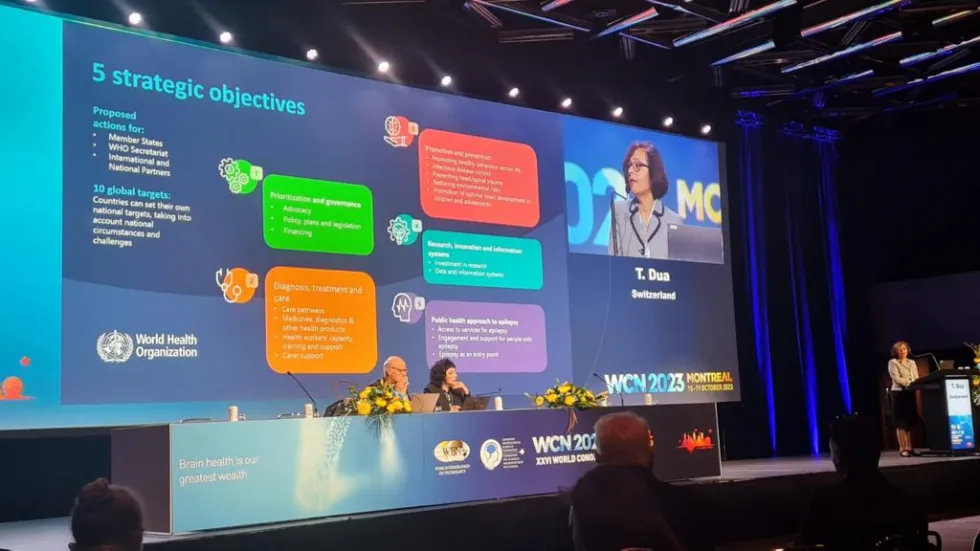
MONTREAL, Oct. 15, 2023 – The World Health Organization (WHO) revealed its new Intersectoral Global Action Plan (IGAP), a critical blueprint for combating neurological conditions that calls for urgent action from governments and health care organizations around the world. IGAP outlines goals to help governments and national health care organizations direct research and investment in areas with the greatest possible impact on global health.
"The Intersectoral Global Action Plan on epilepsy and other neurological disorders is a roadmap that outlines how we can promote brain health, prevent neurological disorders and ensure appropriate diagnosis, treatment and care for people living with these conditions,” said Dr. Tarun Dua, Head of the Brain Health Unit at the World Health Organization (WHO), who presented the new IGAP at the 26th World Congress of Neurology.
Strategic Objectives for Global Brain Health
IGAP outlines five strategic objectives aimed at achieving significant global health outcomes:
- Raise policy prioritization and strengthen governance
- Provide effective, timely and responsive diagnosis, treatment and care
- Implement strategies for promotion and prevention
- Foster research and innovation and strengthen information systems
- Strengthen the public health approach to epilepsy
The WHO will work with Member States to provide resources and tools to support advocates, policymakers, researchers and health care providers in taking the necessary steps to achieve the plan’s global strategic objectives.
“We are really shifting gears from thinking only about the clinical aspects of neurology to the public health aspects of neurology,” said Dua, “This action plan provides a platform to think about that shift.”
The action plan also defines multiple global targets for each of its five strategic objectives. These targets are benchmarks for measuring the success of each objective by 2031. For example, the global targets set for the objective of raising policy prioritization and strengthening governance include:
- 100% of countries have awareness raising or advocacy campaigns for neurological disorders by 2031.
- 75% of countries have updated policies, strategies or plans to include neurological disorders in health policy by 2031.
Addressing the Growing Global Burden of Neurological Diseases
This global initiative represents a landmark coordinated effort to tackle the challenges posed by neurological disorders. This is the first time such a comprehensive plan on neurological conditions has been developed within the World Health Assembly.
"Neurological conditions are the largest cause of disability-adjusted life years and the second-largest cause of death worldwide. They are associated with high treatment gaps, sometimes exceeding 75% in low and middle-income countries,” said Dua. “This necessitates a mandate like IGAP, an opportunity for the global community to unite and combat the burden of these conditions."
Low-income countries currently have an average of 1 neurologist per million people compared to 71 per million in high-income countries. IGAP seeks to address the disparities in diagnosis and care experienced by individuals in low and middle-income countries by expanding training and resources for non-specialist care in regions where neurologists are in short supply.
"There is a lack of neurologists in many parts of the world, particularly in low and middle-income countries,” said Dua. “It is crucial that we involve general practitioners, nurses and other health care professionals in the care of neurological conditions."
Visit wcn-neurology.com to learn more about Dr. Dua and all the featured research at this year’s WCN.
About the World Congress of Neurology
The World Federation of Neurology’s World Congress of Neurology brings together leading neuroscientists and public health experts to turn research into action and emphasize the importance of brain health across the globe. The 26th biennial conference was held in Montreal from October 15 to 19, 2023, and was co-hosted by the Canadian Neurological Society (CNS).
About the World Federation of Neurology
With support from its 124 national Member Societies, the World Federation of Neurology fosters quality neurology and brain health worldwide by promoting neurological education and training, emphasizing under-resourced areas of the world. As a non-state actor in official relations, WFN supports the World Health Organization (WHO) efforts to give everyone an equal chance to live a healthy life. With Member Societies around the globe, WFN unites the world’s neurologists to ensure quality neurology and advocate for people to have better brain health. Learn more about the World Federation of Neurology at wfneurology.org.
Media Contact
Ryan Pollock, Yakkety Yak
ryan@yakketyyak.com







